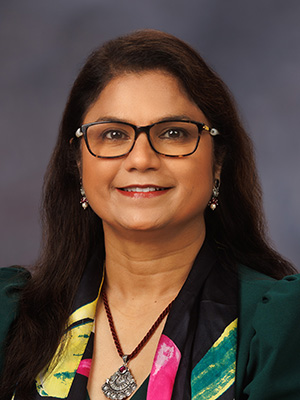Dr. Seema Singh named associate director of education and training

Dr. Seema Singh is the new associate director of education and training for the Cancer Center and Research Institute (CCRI). In this role, Singh will develop and lead a new Cancer Biology track in the graduate program, driving innovation and shaping the next generation of cancer scientists. She will also oversee the development and management of mentoring and educational activities, fostering growth and interdisciplinary collaborations to advance cancer research.
Singh's impressive career includes previous tenured roles as a professor in the Department of Pathology at the USA Mitchell Cancer Institute, University of South Alabama. She has also served on the Admissions Committee of the medical school, the MD with Research Honors Committee, and the Institutional Biosafety Committee, among others. Her extensive experience includes significant research in inflammation and immunobiology, host-tumor interactions, and the social and biological aspects of cancer health disparities.
Singh's academic journey began with a Bachelor of Science and a Master of Science from Aligarh Muslim University in India. She earned her Ph.D. in Pathology and Microbiology from the same institution while completing her research work at a premier institute of the Council of Scientific and Industrial Research, a dynamic network of national laboratories supported by the Government of India. Her postgraduate training includes positions as a post-doctoral fellow and research associate at the University of Nebraska Medical Center and the Eppley Institute for Research in Cancer and Allied Diseases. An avid learner, she recently completed a Master of Business Administration degree, with a concentration in Health Care, at the University of South Alabama. She has also undertaken certificate courses from the National Institutes of Health (NIH) Office of Clinical Research.
Currently, Singh is a principal investigator on an NIH R01 grant investigating how exposure to socioeconomic hardships creates hormonal imbalances and promotes systemic inflammation, putting us at a higher risk of developing several chronic diseases, including cancer. More specifically, her research findings suggest that Black women are more likely to be impacted, increasing their chances of early-onset breast cancer and the diagnosis of aggressive molecular subtypes. In another project funded by the Breast Cancer Research Foundation of Alabama, she has been studying the influence of stress on the immune landscape and heterogeneity of breast cancer.
Singh has authored over 120 journal articles and presented more than 106 abstracts. In addition to her research and teaching, Singh serves as a reviewer for numerous scientific journals across various fields such as Cancer Research, Frontiers in Oncology, and PLOS ONE. She also serves on the editorial boards of several scientific journals and on grant review panels.
Her impactful research is reflected in several patents she has filed and secured. These include a provisional patent for a model studying UV-induced skin cancer and formulations using silver nanoparticles for skin cancer prevention. She also holds patents for methods of diagnosing and treating cancer. Additionally, she is also a co-founder of Tatva Biosciences and serves as its vice president for research.
“Unlocking the mysteries of cancer, training the next generation of scientists, and building partnerships with all stakeholders is imperative for effectively tackling this dread disease.” said Singh. “This is going to be my action plan at CCRI.”


